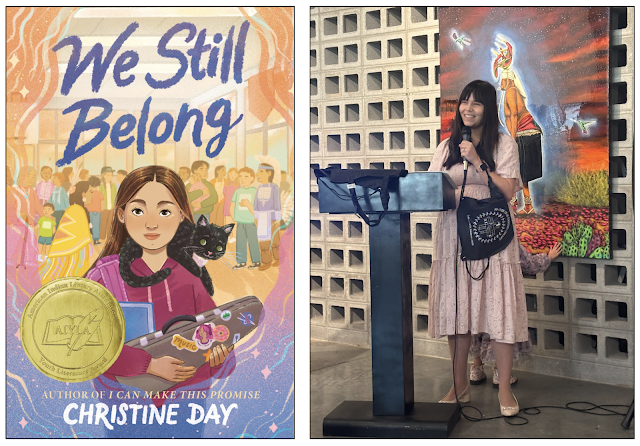Editors Note: On January 25, 2025, the American Indian Library Association (AILA) held its Youth Literature Award Ceremony in Phoenix. I am pleased to share the remarks Laurel Goodluck delivered when she received the American Indian Youth Literature Award in the picture book category for Forever Cousins.
****
AIYLA Medal Acceptance Remarks
Laurel Goodluck
Greetings,
Dosha – Hello, friends. It’s wonderful to be spending the morning with you all. Writing a book for children is a privilege, a responsibility, and a lot of fun.
BUT…
I wasn’t one of those kids who said I wanted to be a writer, but I grew up with oral storytelling.
- My storytelling journey began with my family around the kitchen table in the SF Bay Area in California on weekends with my parents, uncles, aunties, grandmas, and cousins. The grown-ups told us stories of their adventures as children growing up in our homelands in North Dakota and Alaska. Stories of brown bears, gathering cedar bark, their father singing lullabies in Hidatsa and playing Stardust on the Sax, and trading horses for bikes with the town kids in Elbowoods.
- As cousins, these stories were adventures that we wanted to live up to. So, when we ventured home to North Dakota each summer, we were determined to have similar escapades and did. We jumped off logs in the lake, and when wild ponies wandered on our farm, we corralled them and played rodeo; we found rattlesnakes in the garden, and in solemn moments, we gathered around the tipi rings dotting the land and imagined our ancestors’ lives on the prairie.
- But the stories that were told around the kitchen table that later informed all of us cousins as adults were the stories about our chiefs and my grandfather, who was tribal chairman of Fort Berthold. My grandfather, Martin Old Dog Cross, bravely fought against the government to stop the Garrison Dam, which eventually flooded our ancestral lands. Martin would meet with Senators in Washington DC and proclaim, “There is no price for our land.”
- With this legacy of leadership through oral storytelling, I learned that these powerful stories offered keys to resilience. So, with a career in education and mental health and near retirement, I decided to write for children. I wanted to provide all the kids with what my family offered me through oral storytelling.
It began with FOREVER COUSINS.
- It is a story of my family and many families who experienced the Indian Relocation Act. Who knew a picture book format could offer all of this? I didn’t initially; this was my first attempt at a picture book. I soon discovered I could tell a universal story of love and friendship between cousins with all the beauty of our Native culture sprinkled through the story as organically as we live. And the back matter, the author’s note could express my need to tell the untold history and tribal and native cultural relevance. It also began with a lovely team of allies.
- I found Debbie Reese on social media. I Instant Messaged her and asked her many questions. She directed me to Tracy Sorell, who spent over an hour on the phone with me, passing on her wisdom. Later, Traci and I were paired together as mentors and mentees through WNDB (We Need Diverse Books), and everything began to change.
- Tracy introduced me to freelance editor Karen Boss, who was patient and professional and helped me edit Forever Cousins. Then she said, “I don’t say this to everyone; I’d like you to submit this to Charlesbridge.”
- At the same time, I met Nicole Geiger, agent extraordinaire with Full Circle Literary Agency. I knew I wanted to be with this agency, which supported diverse creatives in children’s literature for decades.
- My community expanded through the Kweli Children of Color Conference with Laura Pegram’s leadership, Native writing intensives sponsored by Heartdrum and WNDB with editor Rosemary Brosnan and Cynthia Leitich Smith, Highlights Native retreats with Tracy Sorell, and international online Native writing critique groups. We are a solid Native community of support and a soft nest to retreat to.
Closing
- So, Forever Cousins was created with this circle of support and belief. And with a talented illustrator, Jonathan Nelson, who made the beautiful, vibrant, and playful art. I will forever be grateful to these allies and the community we continue to grow and nurture with many unique tribal voices and needed stories.
- Thank you, American Indian Library Association, for this honor of best picture book, which I’m thrilled to share with Kim Rogers and her brilliant story.
- And last, I thank my family, who offered stories that run as deep as the tipi rings still outlined on our prairie.





